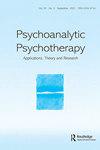Three sessions of intensive short-term dynamic psychotherapy (ISTDP) for patients with dissociative seizures: a pilot study
IF 1.2
Q1 PSYCHOLOGY, PSYCHOANALYSIS
引用次数: 3
Abstract
Intensive Short-Term Psychodynamic Therapy (ISTDP) has demonstrated promising evidence for the treatment of several Functional Neurological Disorders (FND) including dissociative seizures. However, its implementation in secondary mental health and specialist services within the English National Health Service (NHS) is scarce. The aim of this pilot study was to explore the estimates of the therapeutic effects of a 3-session course of this treatment as well as establish safety and acceptability for a complex patient group. The study followed a mixed methods case series design and recruited 18 patients from secondary adult mental health care and specialist neurology services. Participants completed self-report outcome measures at the start, at the end and 1 month following the completion of therapy. Three open-ended questions examined their therapy experiences qualitatively and these were analysed through thematic analysis. All participants who started the treatment (N = 17) completed the intervention and attendance rates were very high (95%). No serious adverse effects were observed and the CORE-OM and BSI showed improvements both at the end of the treatment and at follow-up. Healthcare utilisation was also reduced, including acute medications, A&E attendances and crisis-line usage. The results provide preliminary support for the safe use of ISTDP in this complex group of participants, but further evidence from controlled and randomized studies is warranted.解离性癫痫患者三次强化短期动态心理治疗(ISTDP)的初步研究
短期强化精神动力疗法(ISTDP)已被证明是治疗包括解离性癫痫在内的几种功能性神经疾病(FND)的有希望的证据。然而,它在英国国家医疗服务体系(NHS)的二级心理健康和专家服务中的实施很少。这项试点研究的目的是探索这种治疗的三个疗程的治疗效果的估计,并确定复杂患者群体的安全性和可接受性。这项研究采用了混合方法的病例系列设计,从二级成人心理健康护理和神经专科服务中招募了18名患者。参与者在治疗开始、结束和完成治疗后1个月完成了自我报告结果测量。三个开放式问题定性地考察了他们的治疗经历,并通过主题分析进行了分析。所有开始治疗的参与者(N=17)都完成了干预,出勤率非常高(95%)。没有观察到严重的不良反应,CORE-OM和BSI在治疗结束和随访时都有所改善。医疗保健的使用率也有所下降,包括急性药物、急诊就诊和危机热线的使用。该结果为ISTDP在这一复杂的参与者群体中的安全使用提供了初步支持,但有必要从对照和随机研究中获得进一步的证据。
本文章由计算机程序翻译,如有差异,请以英文原文为准。
求助全文
约1分钟内获得全文
求助全文
来源期刊

Psychoanalytic Psychotherapy
PSYCHOLOGY, PSYCHOANALYSIS-
CiteScore
1.30
自引率
37.50%
发文量
22
期刊介绍:
Psychoanalytic Psychotherapy publishes original contributions on the application, development and evaluation of psychoanalytic ideas and therapeutic interventions in the public health sector and other related applied settings. The Journal aims to promote theoretical and applied developments that are underpinned by a psychoanalytic understanding of the mind. Its aims are consonant with those of the Association for Psychoanalytic Psychotherapy in the NHS (APP in the NHS) in promoting applied psychoanalytic work and thinking in the health care system, across the whole age range.
 求助内容:
求助内容: 应助结果提醒方式:
应助结果提醒方式:


